HubSpot or Zoho: Choosing the Best CRM Platform
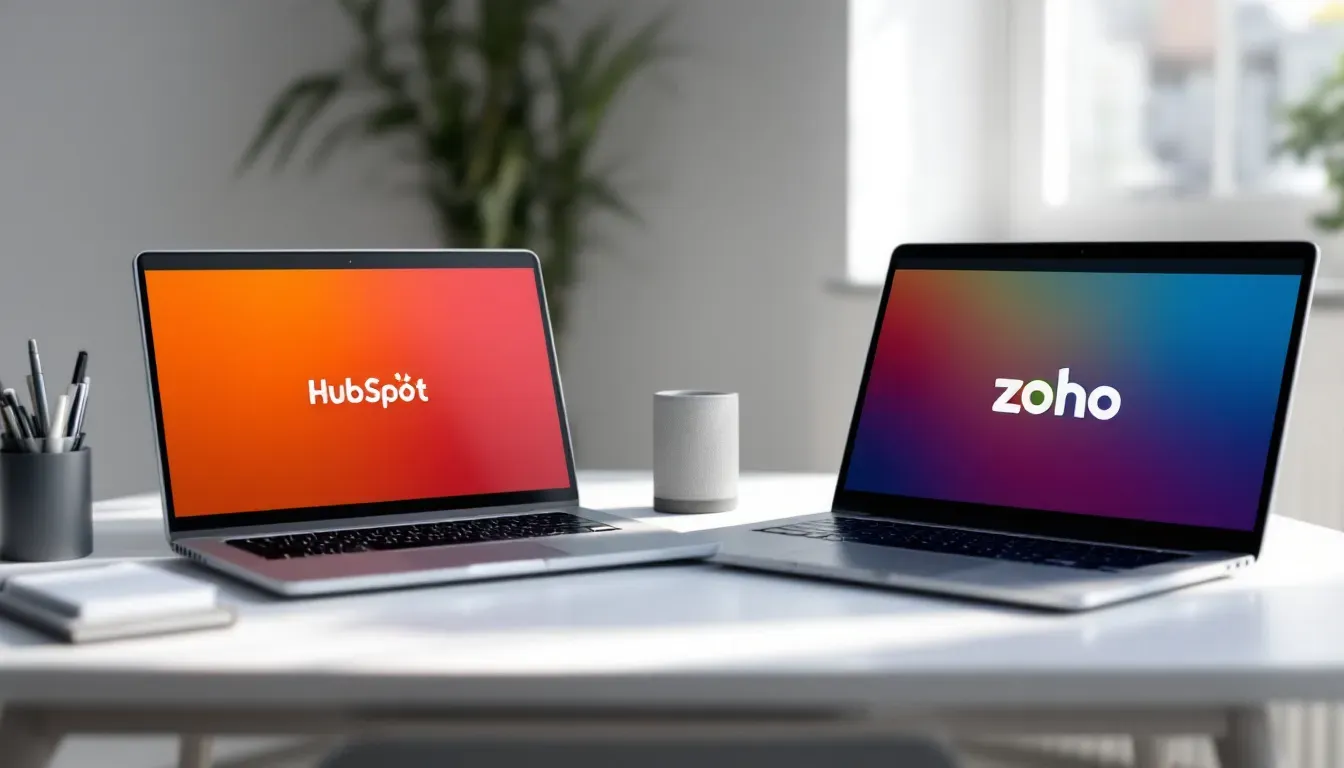
Choosing the right CRM platform can make or break your business’s success. At Drop Cowboy, we understand the importance of this decision.
In this post, we’ll compare two popular options: HubSpot vs Zoho. We’ll explore their features, benefits, and key differences to help you make an informed choice for your company’s needs.
What Makes HubSpot CRM Stand Out?
HubSpot CRM has established itself as a powerhouse in the CRM market, offering a comprehensive suite of tools for marketing, sales, and customer service. Its all-in-one approach simplifies the tech stack for many businesses, reducing the need for multiple disparate systems.
User-Friendly Interface
One of HubSpot’s strongest selling points is its intuitive design. The platform’s clean layout and logical organization make it easy for teams to adopt and start using effectively. This ease of use translates to faster onboarding and higher user adoption rates (which are essential for CRM success).
Time-Saving Automation
HubSpot’s automation capabilities transform many businesses’ operations. The platform allows users to set up complex workflows that handle tasks like lead nurturing, email follow-ups, and deal stage progression automatically. A study by the American Marketing Association found that companies using automation improve their team efficiency by 41%.
Extensive Integration Ecosystem
With over 120 integrations available, HubSpot connects seamlessly with popular tools like Slack, Microsoft Teams, and Zendesk. This extensive integration network allows businesses to create a unified system where data flows freely between applications, enhancing overall productivity.
Free Plan for Small Teams
HubSpot offers a free CRM plan that includes basic features for managing contacts and deals. This entry-level option attracts startups and small businesses looking to explore CRM without a financial commitment. However, as companies grow, they often need to upgrade to paid tiers to access more advanced features.
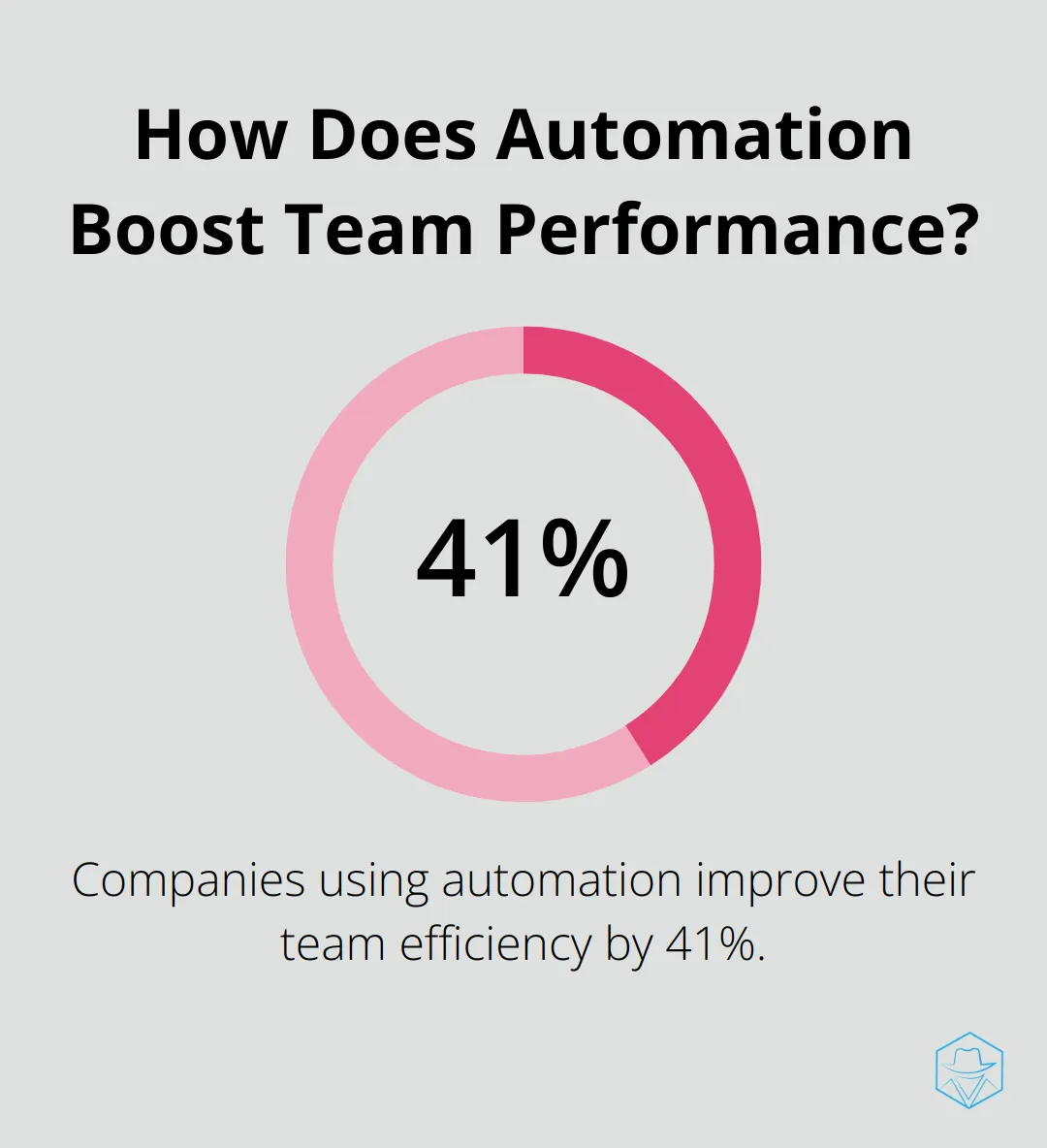
While HubSpot offers robust features, its pricing can escalate quickly as you add more users or access higher-tier functionalities. For businesses seeking a more budget-friendly option with similar capabilities, alternative solutions (like Drop Cowboy) offer competitive pricing with no hidden fees, ensuring you only pay for successful message deliveries.
Now that we’ve explored HubSpot’s strengths, let’s turn our attention to Zoho CRM and examine what sets it apart in the competitive CRM landscape.
What Sets Zoho CRM Apart?
Zia: AI-Powered Sales Assistant
Zoho CRM’s innovative AI-powered sales assistant, Zia, transforms the sales process. Zia analyzes sales data to predict deal closure likelihood, helping teams prioritize efforts effectively. Users report a 25% increase in sales productivity due to Zia’s comprehensive automation capabilities (according to Zoho).
Multi-Channel Customer Engagement
Zoho CRM excels in providing a unified platform for multi-channel customer interaction. The system allows businesses to communicate with customers across email, phone, social media, and web forms from a single interface. This integrated approach prevents missed customer interactions and improves satisfaction and retention rates.
Advanced Analytics for Informed Decisions
The platform’s advanced analytics and reporting capabilities stand out as a major strength. Zoho CRM offers over 40 customizable reports, enabling businesses to gain deep insights into their sales and marketing metrics. Users can create custom dashboards that display real-time data, helping teams track sales goals and identify areas for improvement.
Cost-Effective Pricing Structure
Zoho CRM’s competitive pricing structure attracts many businesses, especially those with budget constraints. Plans start at $14 per user per month, offering a cost-effective solution without sacrificing essential features. This pricing model appeals particularly to small and medium-sized businesses aiming to maximize their CRM investment.
Extensive Customization Options
While some users report a steeper learning curve compared to platforms like HubSpot, Zoho CRM offers extensive customization options. Businesses willing to invest time in mastering the system can tailor it precisely to their needs, potentially yielding significant returns on their investment.
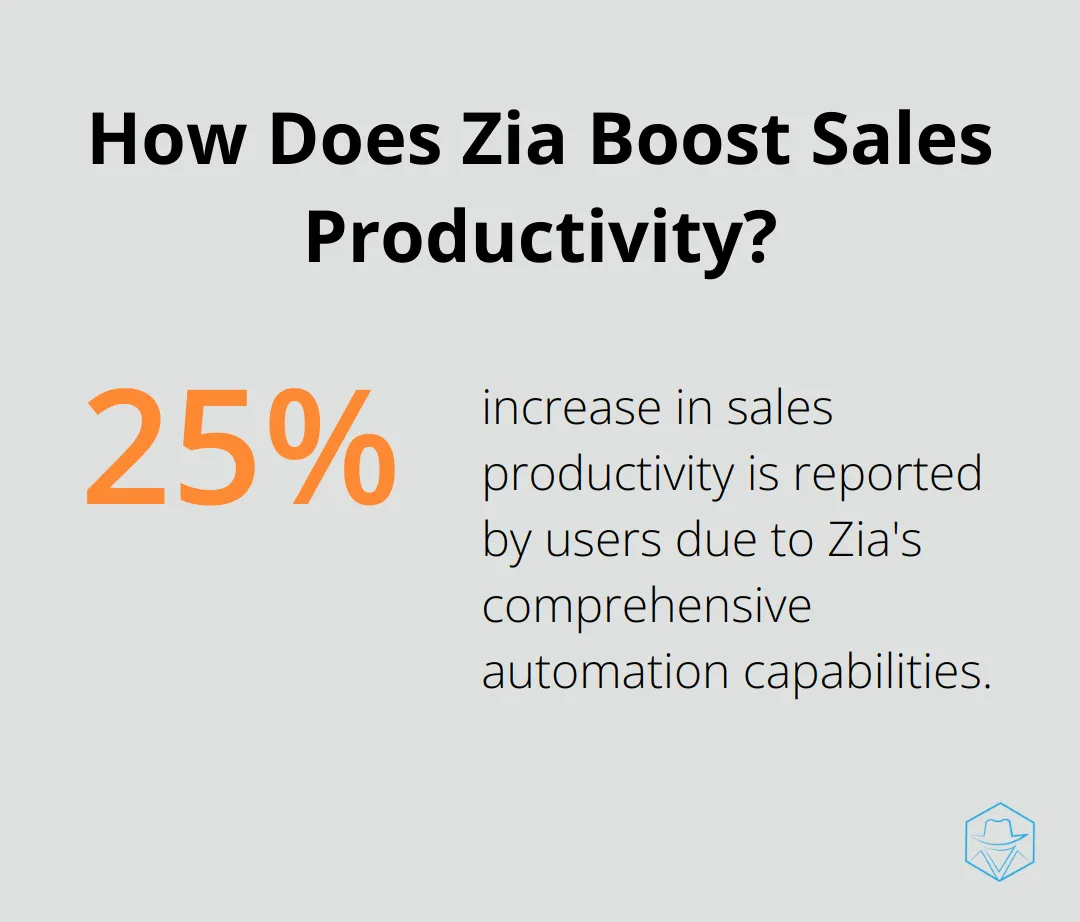
As we compare Zoho CRM’s features to other platforms, it’s important to consider how they align with specific business needs. For instance, while Zoho offers robust general CRM capabilities, companies with a strong focus on voice and SMS communication might find specialized platforms (such as Drop Cowboy) more suitable for their unique requirements. Let’s now examine how Zoho CRM stacks up against HubSpot in key areas of functionality and user experience.
HubSpot vs Zoho: Which CRM Fits Your Business?
When comparing HubSpot and Zoho CRM, several factors impact your business operations. Let’s examine the key differences to help you make an informed decision.
User Experience and Onboarding
HubSpot stands out for its user-friendly interface, which enables teams to adopt it quickly. Its intuitive design and logical layout contribute to faster onboarding processes. G2 consistently rates HubSpot higher for ease of use compared to Zoho.
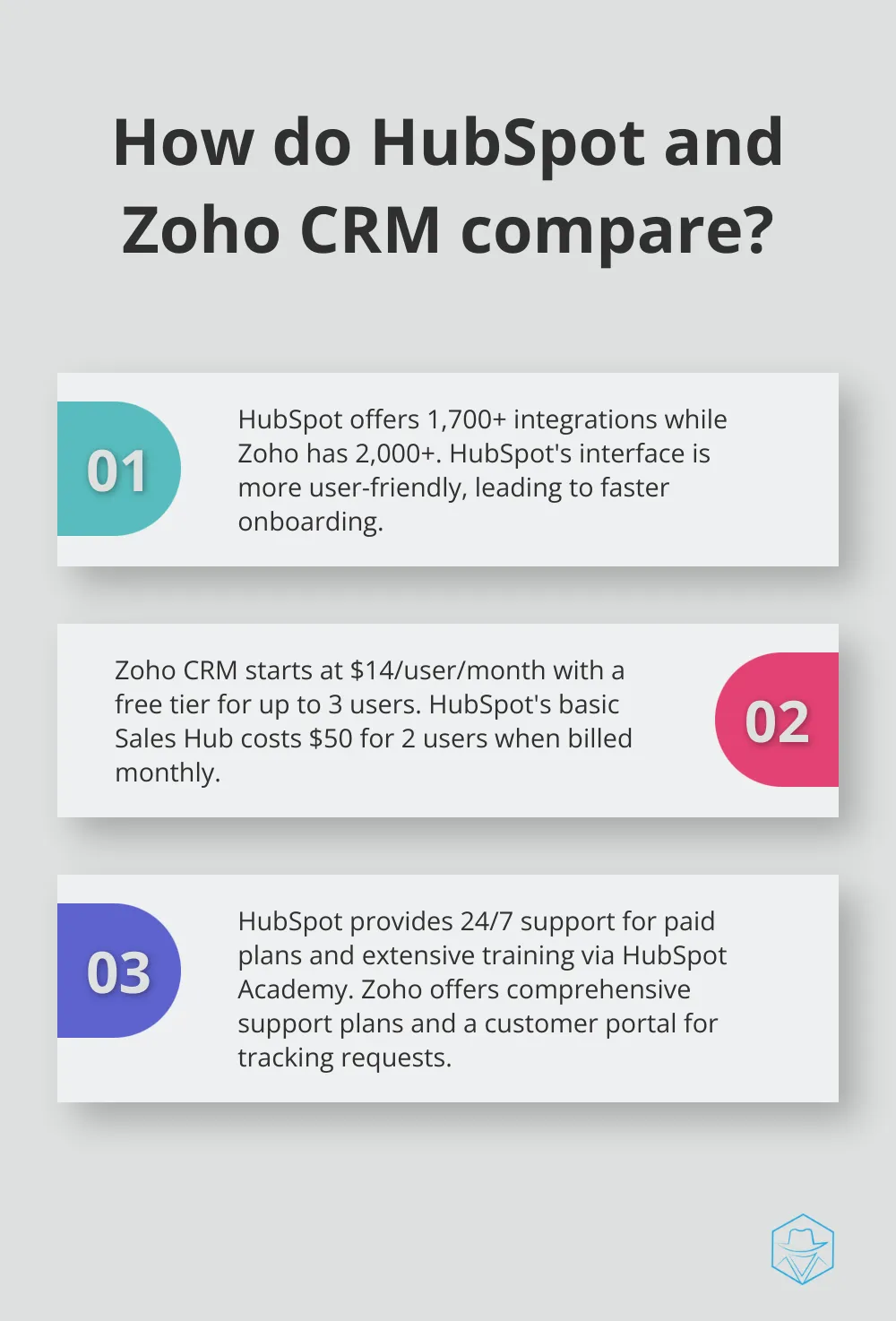
Zoho CRM, while powerful, requires more time to master. However, it offers more extensive customization options, allowing businesses to tailor the platform to their specific needs. This flexibility benefits companies with unique workflows or industry-specific requirements.
Integration Capabilities
Both platforms offer robust integration options, but HubSpot leads with over 1,700 integrations (compared to Zoho’s 2,000+). HubSpot’s seamless integration with its Marketing, Service, CMS, and Operations Hubs provides a unified platform for businesses seeking an all-in-one solution.
Zoho offers a suite of integrated applications beyond CRM, which can streamline the tech stack for small to medium-sized businesses. Its developer tools include capabilities for serverless code deployment and interactive widgets, making them more versatile.
Pricing and Value Proposition
Zoho CRM is generally more budget-friendly, with plans starting at $14 per user per month. This pricing structure attracts startups and small businesses. Zoho also offers a free tier for up to three users, allowing companies to test the platform before financial commitment.
HubSpot’s pricing can increase rapidly as you add more users or access higher-tier functionalities. While it offers a free CRM plan, essential features like workflow automation are restricted to higher-priced tiers. The basic Starter edition of HubSpot Sales Hub costs $50 for two users when billed monthly.
(For businesses focused on voice and SMS communication, specialized platforms like Drop Cowboy offer competitive pricing with no hidden fees, ensuring payment only for successful message deliveries.)
Mobile Functionality
Both HubSpot and Zoho provide mobile applications, but their functionalities differ. HubSpot’s mobile app features a user-friendly interface and provides essential CRM functions on-the-go. However, it lacks some advanced features like scheduled reporting.
Zoho’s mobile app incorporates AI and analytics, offering advantages like voice notes and sales forecasting while mobile. This can particularly benefit sales teams that require in-depth insights and functionality when out of the office.
Customer Support and Resources
HubSpot excels in customer support and educational resources. It offers 24/7 availability for paid plans and provides extensive training materials through HubSpot Academy. These resources help users maximize the platform’s potential.
Zoho provides comprehensive support plans, including a customer portal for tracking requests. While its educational resources may not be as extensive as HubSpot’s, Zoho offers adequate support to help users navigate the platform effectively.
Final Thoughts
HubSpot and Zoho CRM offer distinct advantages in the CRM landscape. HubSpot excels with its user-friendly interface and extensive integrations, while Zoho CRM impresses with competitive pricing and advanced customization. Your choice between HubSpot vs Zoho should align with your business’s specific needs, budget, and long-term objectives.
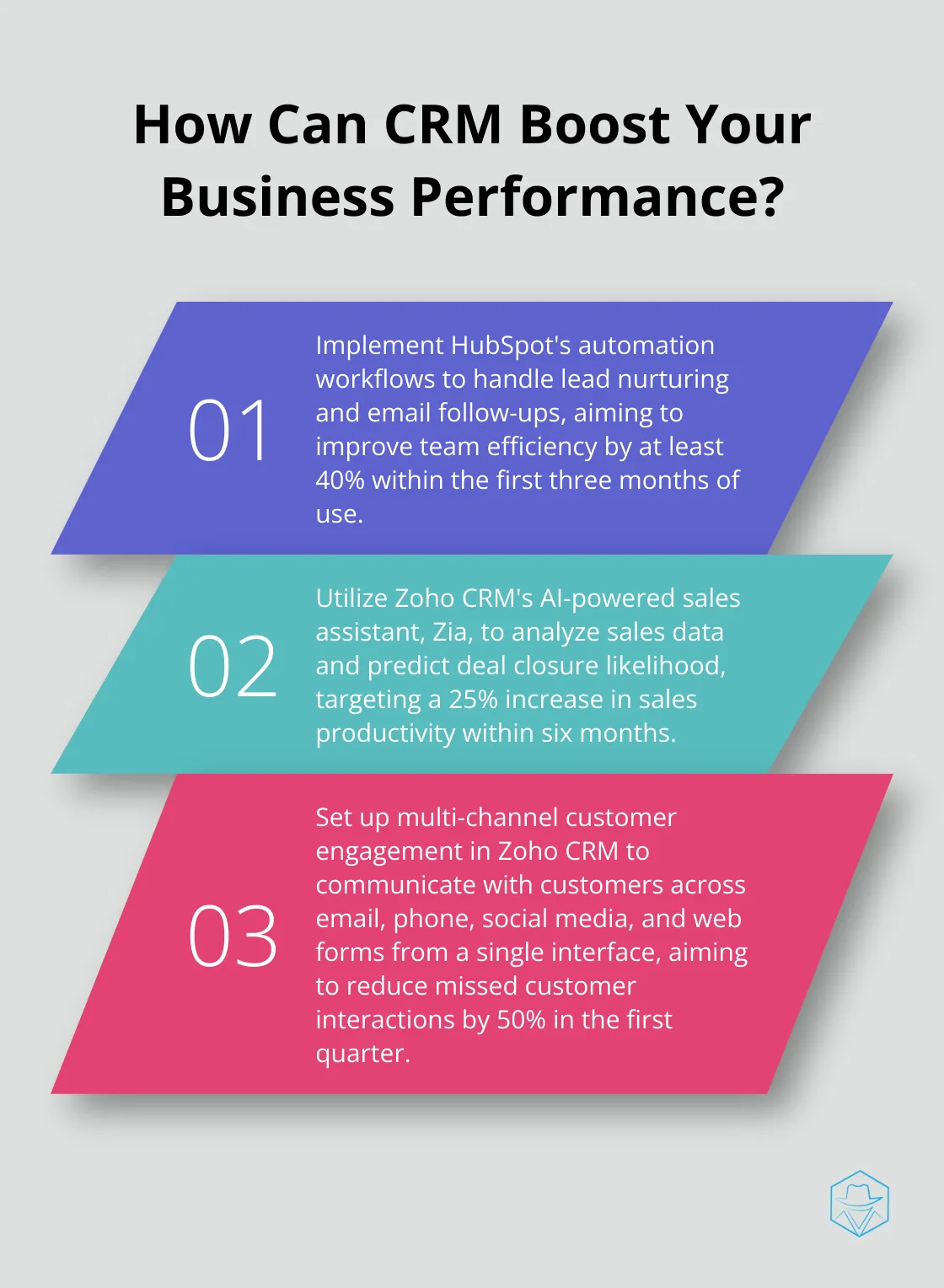
Consider factors such as team size, required features, and scalability when making your decision. If marketing automation and seamless tool integration top your list, HubSpot might be the better fit. For cost-effective solutions with extensive customization options, Zoho CRM could be your ideal choice.
Businesses focused on voice and SMS communication should explore specialized platforms like Drop Cowboy for tailored solutions. Drop Cowboy offers unique features for customer engagement and marketing campaigns (including ringless voicemail and SMS integration). The right CRM platform will streamline your operations and improve customer relationships, setting your team up for success in achieving sales and marketing goals.
blog-dropcowboy-com
Related posts

February 28, 2025
How to Leverage Text Marketing for Small Businesses
Boost sales with small business text marketing. Reach more customers, engage effectively, and drive growth through proven strategies and practical tips.

February 28, 2025
How to Create a Winning Text Messaging Marketing Campaign
Boost engagement with expert tips on creating a winning text messaging campaign marketing strategy that drives results and increases customer interaction.

March 7, 2025
Proven Text Marketing Strategies for Business Growth
Boost growth with proven text marketing strategies. Engage customers effectively and elevate your business with practical, data-driven insights.

February 27, 2025
How to Launch a Successful Text Marketing Campaign
Launch a successful text marketing campaign with practical tips, trends, and tools to boost engagement and drive results effectively.

March 12, 2025
How to Use Ringless Voicemail for Better Results
Learn how to achieve better results with the best ringless voicemail techniques. Optimize outreach for success with proven methods and tips.

March 27, 2025
How to Choose the Right iPaaS Solution for Your Business
Discover essential tips to choose the right iPaaS solution for your business and streamline integration for better efficiency and growth.